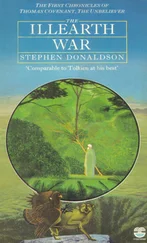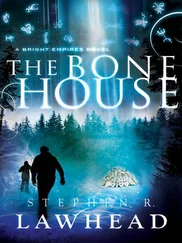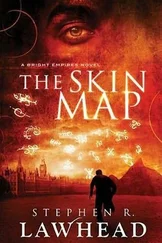The pavement beneath my feet seemed to buckle and heave. I glanced down, and my heart skipped a beat. For I was standing in the center of an elaborate Celtic circle drawn on the sidewalk squares with chalk. The street artists-I had seen them working earlier in the day and paid them no attention-had drawn a primitive maze pattern surrounded by a knotwork border of interwoven colored lines. 1 had often seen sidewalk portraits and landscapes. But never anything like this. Why had they drawn this particular design? Why, of all things, a Celtic maze?
I stood there, clutching my head, staring at the intricately interlaced lines and the dizzying pattern of the maze. I stood there for a long time, the traffic light blinking from red to green over and over, the rain pelting down on me. Staring, staring, unable to move, trapped in that charmed circle-inexplicably bound by those interlocking threads of brightcolored chalk. I might still be standing there, but for the fact that my condition had not gone entirely unnoticed.
For I felt the light touch of a hand on my elbow and became aware of a kindly voice in my ear. «Let me help you,» said the voice.
I swivelled my head toward the sound and found myself lace to face with a white-haired old gent dressed like Central Casting's idea of an aging country squire complete with porkpie hat and black briar walking stick.
«N-no thanks,» I told him. «I'm okay. Thanks.»
But the grip on my elbow tightened. «Pardon me, but I think you need a hand,» he insisted. He raised his walking stick before my face and then lowered it, pointing to the strange drawing on the pavement. He tapped the chalk with the tip of his stick three times. This simple action, deliberate and slow, gave me to know that our meeting was not mere happenchance and he was no ordinary passer-by. He knew something.
«I had better see you home, I think,» he told me. «Come along.»
I looked helplessly at my feet, for I still could not move them. «There's nothing to fear,» the old man said. «Come.»
At his word, my feet came free and I stepped easily from the circle. We crossed the street and, by the time we reached the other side, I was thoroughly humiliated. «Thanks,» I said, stepping up on the sidewalk. «Really, thanks a lot. I'm okay, though. I just got a little dizzy, you know. I had a bump on the head earlier, but I'm okay now.» The words just tumbled out. «I'll be fine. Thanks for your help. . . .»
But the old gent did not release his grip on my arm. rhinking that he maybe didn't hear so good, I raised my voice. He stopped suddenly and turned to me. «You should have that bump looked at.»
«Yeah, I'll do that. Thanks.» I tried to disengage his hand from my arm, but he would not let go. «You've been a big ielp. I won't trouble you any further.»
«Oh, it's no trouble. I assure you,» he said airily. «I'm afraid I must insist.»
«Are you a doctor?» I asked. I don't know why-something about his solicitous nature suggested it.
«I'm all the doctor you need,» came the reply, and next thing I knew we were stumping along the all-but-deserted street, arm in arm. He seemed determined to have a look at my bump, and I seemed to have no choice in the matter. After the trauma of the last few days, my will power was at low ebb, so I took the path of least resistance and went with him.
After much twisting and turning down this street and that, we eventually arrived at a low door in Brewer's Lane. A brass plaque proclaimed the residence of D. M. Campbell, Tutor. He put a key in the lock, jiggled it open and ushered me in.
«Come in, please,» said the old man. «Come in out of the cold, my friend. Make yourself at home. I'll get something warm on the hotplate. Put your coat there.»
He peered at me myopically, patting his pockets absently. I stepped into his dim apartment. «Kind of you to invite me. But, really, it isn't necessary. I'm fine.»
He smiled and bustled off into the dark interior, unbirnoning his coat as he went. His voice lingered behind him. «A pleasure. My load is light this term. As it is, I don't have enough visitors. Come, sit down. Won't be a moment.»
I found an ancient, overstuffed chair and dropped into it, wondering why I was there. Well, I thought, I don't want to hurt his feelings. Just a quick cup of tea and I'll be on my way.
For his part, the old gent drifted in and out, snapping on lights here and there to no great effect. The room remained dark as before. At one point he came to stand before me, gazing down at me as if he had won me in a turkey shoot.
«Introductions,» he said abruptly. «Professor Nettleton. Merton College. How do you do?»
«Not Campbell?» I wondered aloud.
«A former occupant,» he explained. «I value my privacy.»
«And you are?»
«Oh, right. My name is Lewis-Lewis Gillies.»
«Glad to meet you Mr. Gillies,» he began. At that moment a kettle in another room whistled and he bustled to attend it. He returned a moment later, «Best give its moment,» he said pleasantly, and proceeded to clear off a table piled high with papers. It gave me a chance to study him.
Nettleton was the archetypal Oxford don. Shortish, baldish, sixtyish, slightly stooped and near-sighted from deciphering the crabbed text of too many illegible manuscripts. What hair he possessed was wispy and white like candy floss; it floated over his head rather than resting there. His apparel was a subdued riot of mismatched tweed-all of ambiguous hue. He wore a Balliol tie, a bright-blue woolen waistcoat, and stout, brown Irish brogues on his feet.
The kettle sounded again, and while my host busied himself with the practicalities-I could hear him clanking around in the dim recesses-I took the opportunity to examine my immediate surroundings. The professor's room was one of those immense Victorian caverns in which Oxford abounds, and no less eccentric than its occupant: twelve foot ceilings; a forest of ancient dark oak panelling; mammoth carved mahogany sideboards, mantles, bookcases, and tables; a desk that could easily serve as the bridge of a battleship; great soft chairs one could get lost in. The dark oak floors were covered with about an acre of faded, threadbare carpet; the lighting apparently dated from the Dark Ages; and the heating system was older than Moses.
I glanced around at the various shelves, which were crammed with knickknacks and whatnots. Curiosity drew me from my chair and I approached the shelves for a closer look. They supported a pack rat's museum of queer artifacts: odd-shaped stones; peculiar knobs of polished wood; tablet-sized slabs of slate with strange inscriptions scratched on them; gleaming nuggets of misshapen coins; a collection of carved-horn combs and buttons made from animal teeth. Bristling from a nook was a stuffed yellow cat the size of a Cocker Spaniel, and a gross black-feathered carcass I took to be a mounted raven.
So deeply engrossed in this inventory was I, that I did not hear Nettleton creep up behind me. I felt a prickly sensation on my neck and swung around to find him gazing placidly at me, two steaming mugs of something in his hands. I say mugs-the vessels were tall and had no handles, and they appeared to be made of a sort of crude stoneware. I'd seen a similar style of pottery before-in the Ashmolean Museum next to stag which read Beaker, Neolithic, ca 2500 BC.
My host handed a beaker to me, raised the other to his lips and said, «Slointe!»
To which I replied, «Cheers!» I took a large sip, and nearly spewed the contents across the room. I managed to choke it down-but the corrosive liquid grated my throat like a wood rasp and produced an afterburn like an F16.
Nettleton smiled benignly at my discomfort. «So sorry, I should have warned you. There's whisky in it. I find a wee dram on a day like this helps to drive out the chill.»
Читать дальше







